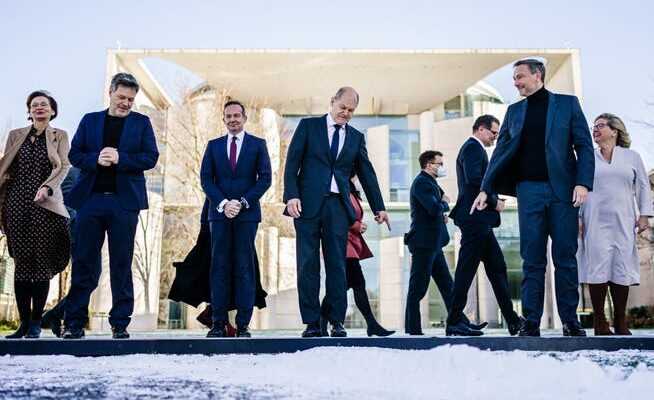At their first closed conference, Chancellor Scholz and his ministers continue their rhetoric about progress. The presidency of the G-7 under the German chairmanship should focus on sustainability.
In search of the right location: Chancellor Scholz and his ministers gather for a group picture at their first retreat in Berlin.
Around six weeks after taking office, the new federal government met on Friday for its first closed conference. Federal Chancellor Olaf Scholz discussed foreign policy issues with his sixteen ministers, above all the Ukraine crisis and the presidency of the G-7, which Germany will take over this year. It was also about “accelerating investments in the future”, to which the traffic light coalition has committed itself, true to its motto of daring more progress.
The first priority is combating climate change. Scholz suggested founding a “climate club” that could be joined by those who are willing to stop climate change. The democratic industrialized countries should lead the way. It is the declared goal of the federal government to enable economic developments in the world that also help poorer countries, said the chancellor after the closed session.
Avoiding trade wars
According to Robert Habeck, the Green Federal Minister for Economic Affairs and Climate Protection, the German presidency of the G-7, an informal forum of the seven leading western industrial nations, should also focus on sustainability. The trade relations are of particular importance from an ecological point of view; there should be no trade wars.
The highlight of Germany’s G-7 presidency will be the industrialized nations summit in June, which will be held at Schloss Elmau in the Bavarian Alps.
Pandemic debt
Scholz emphasized that Germany must become faster in order to implement the “ambitious plans” of this government: the expansion of renewable energies such as wind turbines, a better digital infrastructure, solutions for housing. Germany wants to build 400,000 new homes per year. How it is compatible with the ecological orientation of the government projects when more areas have to be built on in order to create living space was not mentioned in the statements made after the closed session.
The Federal Minister of Finance and FDP leader Christian Lindner said it was time to switch from crisis to prevention mode. It is about questions of economic recovery and the stability of currencies, which are of great importance due to the new debt caused by the pandemic. Lindner never tired of repeating one of his party’s core goals: reducing bureaucracy.
De-escalate Ukraine conflict
The closed conference continued to deal with the global fight against the pandemic, which, according to Scholz, was “of the utmost importance”. The traffic light coalition has not changed its stance on the issue of compulsory vaccination: MPs should decide on this issue according to their conscience and without party pressure. Since the topic has a high potential for conflict, it is good to have an open debate about it, explained Lindner.
In the Ukraine conflict, Scholz reiterated the course of the federal government, about which Federal Foreign Minister Annalena Baerbock had informed the day before after a meeting with her American counterpart Antony Blinken. Any military aggression against Ukraine comes at a high cost, Scholz said. NATO and the EU agree on this: “We are preparing so that we can react.” Everything must now be done to continue talks and de-escalate the conflict.
Dissatisfied with the federal government
As in previous joint appearances, the ministers again confirmed the cohesion of the traffic light coalition. The will to help pull through, said Habeck. That’s nice.
However, there is no lack of critical public perception of government work. As soon as the government is in office, new surveys are started again, which are supposed to provide information about how the population evaluates the traffic light coalition. A survey by the opinion research institute Yougov showed that 45 percent were rather or very dissatisfied with the government. 37 percent were satisfied, 17 percent gave no information.
